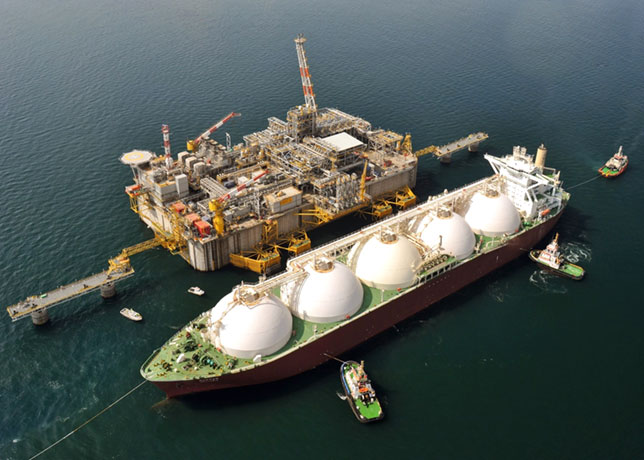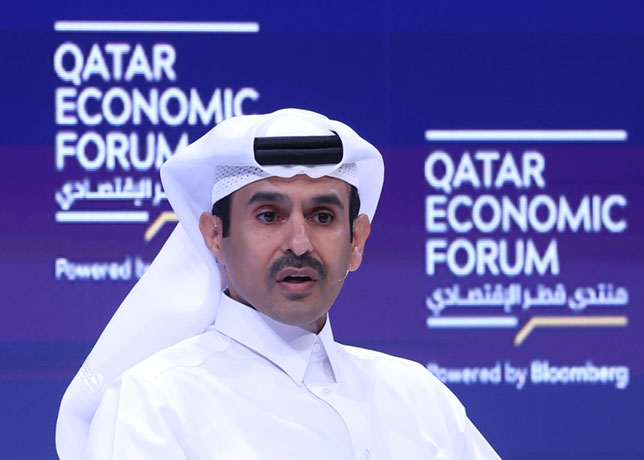
 Qatar has signed major LNG sales deals this year
Qatar has signed major LNG sales deals this year
With plans to double its liquefied natural gas (LNG) production capacity, Qatar needs a much bigger and wider market for its increased output.
The gas giant is looking both East and West for consumers and partners and has been quite successful in attracting several big players for huge long-term deals.
Qatar is among the world’s biggest LNG exporters alongside Australia, Russia, and the US. It held the top spot for years until Australia overtook it in 2021. In 2023, Qatar exported approximately 82 million metric tons per annum (MTPA) of LNG.
Qatar has not had difficulty securing long-term liquefied natural gas (LNG) contracts and will sign more this year, QatarEnergy CEO and State Minister for Energy Saad Al-Kaabi has said.
"We've actually secured 25 million tons of long-term LNG sales (in the last 12 months) and I can tell you also that we're signing more this year," he said.
State-owned QatarEnergy has been signing supply deals with European and Asian partners for gas that is expected to come onstream from its massive North Field expansion.
The group has already signed supply deals with several multi-national companies including TotalEnergies, Shell, Eni, Sinopec, CNPC, ExxonMobil or ConocoPhillips.
MORE DEMAND LIKELY
Competition for LNG had ramped up since the beginning of the war in Ukraine in February 2022. Europe, in particular, needs vast amounts of the fuel to help replace the Russian pipeline gas that had made up almost 40 per cent of the continent's imports.
Al-Kaabi said he saw a future need for more LNG in European markets. "The comfort that they get in Europe is because they had two very warm winters and they filled up all the storages and they didn't need to use much of it," he said.
"So if you have two harsh winters or normal winters ... you're always going to need a lot more LNG. And the world will need much more LNG with the growth and I don't see an oversupply."
According to S&P Global estimates, global LNG demand is forecast to climb 45% by December 2030, from December 2023.
Among the recent deals is a definitive agreements with CPC Corporation, Taiwan (CPC) covering the long-term supply of LNG to CPC and partnership in the North Field East LNG expansion project (NFE). The two parties signed an LNG Sales and Purchase Agreement (SPA) for the delivery of four million tons per annum (MTPA) of LNG from the NFE project to CPC over a period of 27 years.
The two sides also signed a share sale and purchase agreement pursuant to which QatarEnergy will transfer to CPC a 5% interest in the equivalent of one NFE train with a capacity of eight MTPA. This transfer will see CPC become a partner in the NFE project without affecting the participating interests of any of the other shareholders in the project.
Meanwhile, a Fitch Solutions report said competition between the US and Qatar in Europe's LNG market is expected to heat up as Qatar seeks to secure long-term LNG SPAs with European customers. Besides QE's long-term SPA with ConocoPhillips to supply 1.0 mtpa of LNG from NFS intended for Europe, the company has signed two long-term SPAs with Shell and TotalEnergies to supply 7.0 mtpa of LNG to Europe for 27 years starting from 2026. LNG cargoes are expected to be delivered to Shell’s Gate LNG terminal in the port of Rotterdam and TotalEnergies’ Fos Cavaou LNG receiving terminal in southern France.
Based on current export and new supply agreements, Qatar's contracted LNG exports to Europe could rise from 18.7 mtpa in 2023 to 28 mtpa in 2026, closing the gap with US exports. Additional LNG exports to Europe could come from Eni's equity LNG from the NFE project, in which Eni holds a 3.12% stake, equivalent to 1.0 mtpa of LNG production.
CHINA, INDIA OPPORTUNITIES
China and India present huge opportunities for Qatar to expand its LNG sales and production capacity, the report said.
QE’s equity share sale to Sinopec and PetroChina in the NFE and NFS projects highlights QE’s long-term strategy to penetrate China’s booming LNG market. Chinese companies have signed contracts to import up to 8 mtpa from the NFE and NFS projects. Based on these contracts, Qatar’s LNG exports to China could increase to 25 mtpa by 2026, which would represent about 32% of Qatar’s current LNG production capacity. Besides contracted volumes, Sinopec and PetroChina could lift an additional 0.8 mtpa of equity volumes, either for exports to China or for trading in international markets.
China will remain critical to Qatar’s long-term LNG market development strategy, as demand-side fundamentals in China’s natural gas market remain strong, supported by coal-to-gas fuel switching policies and expanding city gas networks, the report said.
India presents another major market for Qatar, as India’s appetite for LNG is growing rapidly. Qatar has a long-standing energy relationship with India, having signed an SPA with Petronet LNG in 1999. In February 2024, QE renewed an SPA with India’s Petronet LNG to supply up to 7.5 mtpa of LNG starting in May 2028.
Compared to China, India’s willingness to pay for Qatari LNG appears to be lower. Qatar’s LNG trade with India has not been growing rapidly, but India has incentives to import LNG from Qatar, given its geographic proximity and lower shipping costs.
Unlike China, Indian companies are not party to Qatari LNG projects and are unlikely to secure long-term SPAs, limiting the potential growth in LNG trade between the two countries. India has been increasingly looking to US LNG as an alternative source of supply, but Indian consumers are more likely to import contracted LNG from Qatar, given the geographic proximity and lower shipping costs.
The large-scale expansion of India’s LNG import capacity, which is set to rise to around 65 mtpa (88 bcm), could further support Qatar-LNG trade growth, the report noted.
Late last year, QatarEnergy announced the successful integration of all marketing and marketing-related activities formerly managed by QatarEnergy LNG. This is a major move towards consolidating QatarEnergy’s position as a global energy leader and an important milestone to enhance the effectiveness of LNG marketing and sales from the State of Qatar.
With this integration, QatarEnergy leverages a combined set of technical, commercial, and financial capabilities to create an enhanced center of excellence for the marketing and sale of all energy products exported from Qatar. It places QatarEnergy in a unique position to deliver unparalleled service and value to its customers and stakeholders, hence, reinforcing QatarEnergy’s commitment to delivering excellence.
ADVANCED LNG VESSELS
To support its LNG ambition, QatarEnergy signed several major shipping deals. In May, a long-term agreement was signed with Qatar Gas Transport Company Limited (Nakilat) pursuant to which Nakilat will own and operate nine "QC-Max" class LNG vessels, the largest LNG vessels ever built.
The nine QC-Max vessels, with a capacity of 271,000 cu m each, constitute half of the 18 advanced QC-Max class LNG vessels that will be constructed at China’s Hudong-Zhonghua Shipyard.
QatarEnergy’s fleet expansion programme encompasses the execution of shipbuilding contracts and time charter agreements for 104 conventional LNG vessels and 18 QC-Max class LNG vessels, for a total of 122 ultra-modern vessels, with the first new ship expected to be delivered by the end of the third quarter of this year.
In April, QatarEnergy signed an agreement with China State Shipbuilding Corporation (CSSC) for the construction of 18 ultra-modern QC-Max size LNG vessels, marking a significant addition to its historic LNG fleet expansion programme.
The new vessels will feature state of the art technological innovation and environmental performance.
Al-Kaabi said: "With a total value of almost $6 billion for these ultra-modern, largest ever LNG vessels by size, the agreement we signed today is the industry’s largest single shipbuilding contract ever."
Eight of the 18 QC-Max size LNG vessels will be delivered in 2028 and 2029, while the other 10 will be delivered in 2030 and 2031.
Al-Kaabi said: "We are very proud to have Qatar’s flagship LNG shipping and maritime champion join a list of world-class shipowners operating our state-of-the-art QC-Max LNG vessels. There is no doubt that this is another testament to Nakilat’s significant capabilities."
Al-Kaabi added: "With the signing of the industry’s largest single shipbuilding contract ever, QatarEnergy is pushing ahead with the implementation of its historic LNG vessel expansion program with full confidence that Nakilat and our selected international shipowners will ensure that our fleet is operated to the highest and most advanced safety, technical and environmental standards."
The long-term agreement follows February’s selection of Nakilat as the owner and operator of 25 conventional-size LNG vessels. It also follows the signing of similar agreements in Beijing with three Chinese ship owners for the operation of nine new QC-Max class LNG vessels as part of QatarEnergy’s historic LNG fleet expansion programme, which will cater for QatarEnergy’s future requirements.



















































































